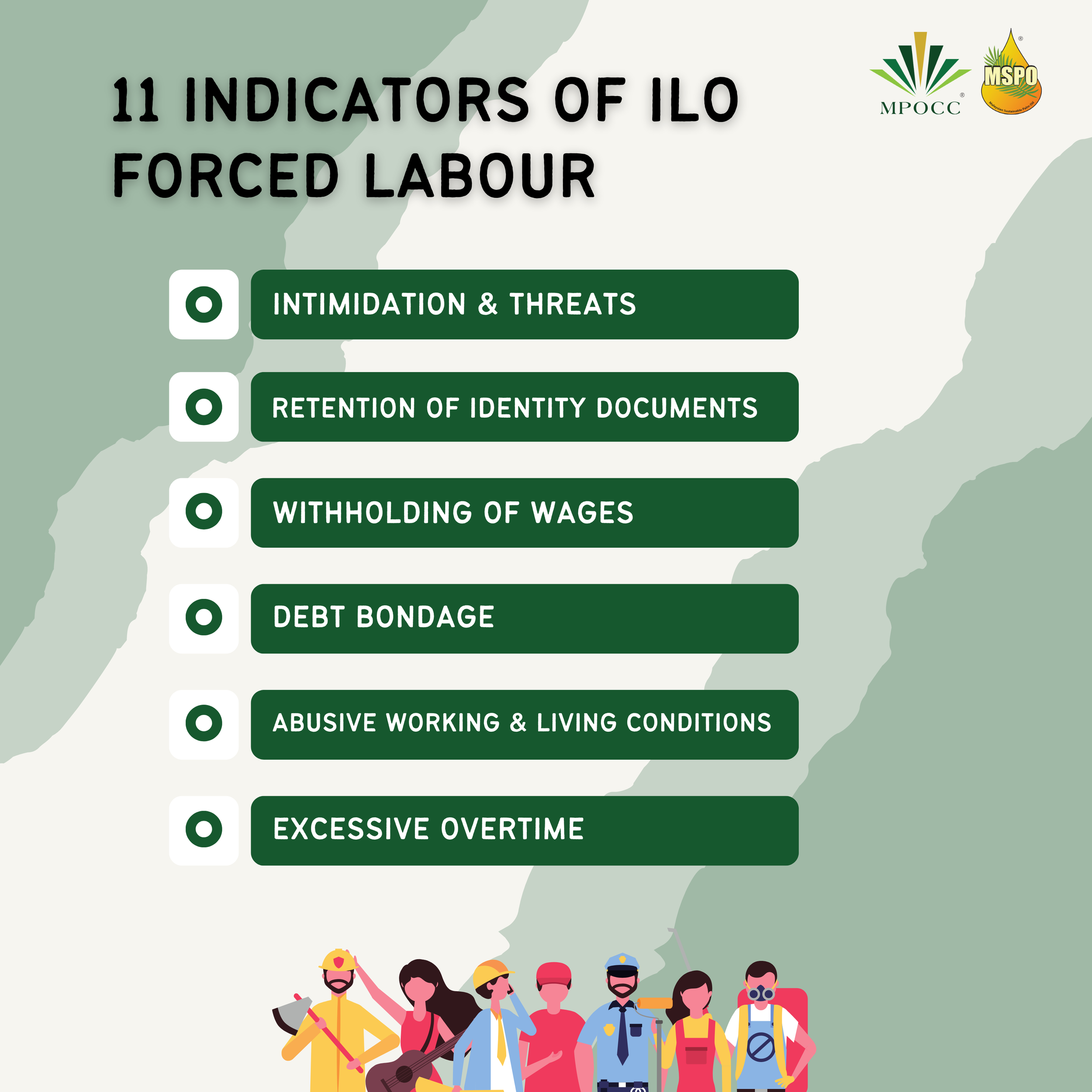Forced Labour in Malaysian Palm Oil Industry
Written by, Yazreen Md Sabri, MPOCC
The 11 indicators of ILO forced labour are the abuse of:
Vulnerability
Deception
Restriction of movement
Isolation
Physical and sexual violence
Intimidation and threats
Retention of identity documents
Withholding of wages
Debt bondage
Abusive working and living conditions
Excessive overtime.
Other than palm oil industries, rubber is also a target of forced labour issues by many green-eyed competing countries. These two industries are the major contributors to the Malaysian economy; therefore, it is important to adhere to fair labour practices to avoid economic sanctions.
This article will give an overview of forced labour in the Malaysian law context.
Malaysian Law on Forced Labour
There is no definition of forced labour in Malaysia legislation. Nonetheless, forced labour is a criminal offence, so it is often prosecuted under The Anti-Trafficking in Persons and Anti-Smuggling of Migrants Act 2007 (Act 670) (ATIPSOM Act). Forced labour comes in the form of exploitation in Section 2 of the Act which defines:
Exploitation - like all forms of sexual exploitation, forced labour or services, slavery, or practices like slavery, servitude, any illegal activity, or the removal of human organs. Article 6 of the Federal Constitution prohibits all forms of slavery and forced labour except for compulsory service for national purposes.
Malaysia has ratified 18 ILO Conventions, including 6 of the 8 Fundamental Conventions. Of the 18 ratified, one Fundamental Convention on the Abolition of Forced Labour (no.105) was denounced in 1990 and is not in force. The other two Fundamental Conventions not ratified are Convention 087 on Freedom of Association and 111 on Discrimination in Employment.
Legal, Social and Sustainability
In Malaysia, forced labour allegations are generally linked to the recruitment and employment of migrant workers or workers from rural areas. For the agricultural commodity industry like palm oil and rubber, it requires a large amount of labour ranging from highly skilled to low skilled workers.
The recruitment of migrant workers to perform low-skill tasks is considered a cheap with high productivity option. Nevertheless, the high demand for the ‘position’ is high to feed the economic needs mostly from the neighbouring countries instead of local.
Meeting the social needs of the global citizen, lead to other social issues among the citizens such as cultural differences, poverty, profit-centric, and others that can’t simply be considered irregular in between the relation of socio-legal status and forced labour.
Looking at the importance of the agriculture commodity industry for contributing to the national and global economy, the issues of forced labour were then taken into force by law and standard that however comes later after receiving the global pressure. Malaysia, as mentioned earlier, has yet to have a specific act on forced labour, therefore there’s a need to have more robust policies.
It will be more efficient to use the bottom-up approach where the employers’ organizations are included in the development of national policies with regards to forced labour and should receive the support needed in fulfilling expectations placed on business. For instance, national action plans against forced labour and trafficking in persons should be elaborated in consultation with employers’ organisations.
Participation in legislative reforms and policy development ensures that employers’ perspectives are represented throughout negotiations.
Dayak Farmer Encourages Girl Scouts of America Girl Guides of Canada to Support Indigenous Peoples
Ugak Sanggau, a Dayak from the Malaysian state of Sarawak has taken on a new mission to fight for the rights of indigenous peoples.
Labour Issues in Palm Oil Industry
For the palm oil industry, a top-bottom approach to the forced labour issue had come into enforcement when the Malaysian Palm Oil Board (MPOB) as the regulatory body had revised MPOB Act by including the need for the plantation company to be certified by the Malaysian Sustainable Palm Oil (MSPO) Standard.
In MSPO Standards 2020, the plantation company must comply with Principle 4: Responsibility to social, health, safety, and employment condition. Any violence of the standard will result in revoking of MPOB license or worse, operation suspension.
In developing the MSPO standards, the process requires a wide range of inputs and endorsements from various stakeholders in order to build credibility among other standards, which only shows the urgency to expedite the bottom-up approach to tackle any issues pertaining to labour.
The SDG 8 target can conclude the need to tackle the forced labour issue in the industry and the effect on the social and economic needs.
In conclusion, it is important for business organisations to respect their legal obligations to eliminate forced labour in their operations in meeting the national laws and regulations as well as international standards. In the interest of the economy, this will make business sense, protects, and attracts investment, ease cross-border trading and promotes fair competition.





